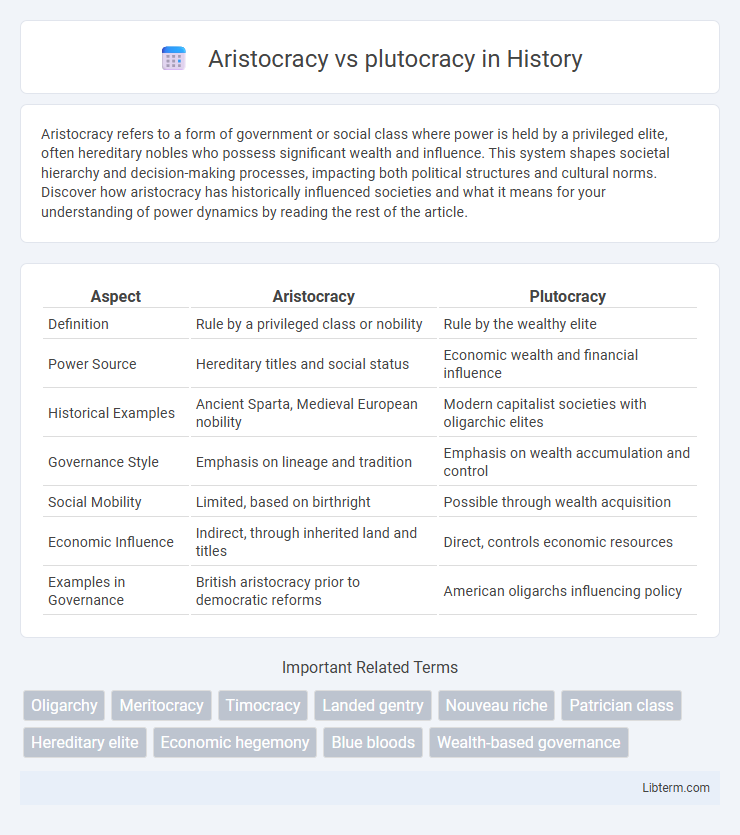Aristocracy refers to a form of government or social class where power is held by a privileged elite, often hereditary nobles who possess significant wealth and influence. This system shapes societal hierarchy and decision-making processes, impacting both political structures and cultural norms. Discover how aristocracy has historically influenced societies and what it means for your understanding of power dynamics by reading the rest of the article.
Table of Comparison
| Aspect | Aristocracy | Plutocracy |
|---|---|---|
| Definition | Rule by a privileged class or nobility | Rule by the wealthy elite |
| Power Source | Hereditary titles and social status | Economic wealth and financial influence |
| Historical Examples | Ancient Sparta, Medieval European nobility | Modern capitalist societies with oligarchic elites |
| Governance Style | Emphasis on lineage and tradition | Emphasis on wealth accumulation and control |
| Social Mobility | Limited, based on birthright | Possible through wealth acquisition |
| Economic Influence | Indirect, through inherited land and titles | Direct, controls economic resources |
| Examples in Governance | British aristocracy prior to democratic reforms | American oligarchs influencing policy |
Defining Aristocracy and Plutocracy
Aristocracy is a form of government where power is vested in a privileged class, typically based on hereditary nobility, social rank, or moral superiority, emphasizing governance by the "best" individuals. Plutocracy contrasts this by concentrating control in the hands of the wealthiest individuals or families, where economic power dictates political influence and decision-making authority. While aristocracy values lineage and status for ruling legitimacy, plutocracy prioritizes financial capital as the foundation of governance.
Historical Origins of Aristocracy
Aristocracy originated in ancient Greece, where it was defined as rule by the "best" or nobility, typically land-owning families with hereditary privileges. This form of governance emphasized social hierarchy based on birthright and cultivated cultural values, distinguishing aristocrats from common citizens. Unlike plutocracy, which centers power on wealth accumulation regardless of lineage, aristocracy historically rooted political authority in noble bloodlines and traditional social status.
Plutocracy: Emergence and Evolution
Plutocracy, a system where power is concentrated in the hands of the wealthy, emerged prominently during the industrial revolution as economic elites leveraged capital to influence political decisions. Over time, plutocratic structures evolved through corporate lobbying, campaign financing, and ownership of media, solidifying wealth-based dominance in governance. This evolution contrasts with aristocracy, which bases power on hereditary nobility rather than wealth accumulation and economic influence.
Social Structure and Power Dynamics
Aristocracy is a social system where power resides with a hereditary nobility, emphasizing lineage and traditional privileges within the social hierarchy. Plutocracy prioritizes wealth as the key determinant of influence, concentrating power in the hands of the richest individuals regardless of ancestry. Both systems shape societal power dynamics by privileging distinct forms of elite control--birthright in aristocracy and financial assets in plutocracy.
Wealth, Inheritance, and Class Mobility
Aristocracy is characterized by power concentrated in a hereditary elite whose wealth and status are passed down through lineage, limiting class mobility. Plutocracy emphasizes rule by the wealthy, where wealth accumulation, rather than birthright, dictates influence, allowing for more fluid class transitions based on economic success. Wealth inheritance in aristocracy secures social rank, while in plutocracy, wealth acquisition drives class mobility and political power.
Governance: Roles in Political Systems
Aristocracy and plutocracy differ significantly in governance roles within political systems; aristocracy entrusts power to a select class deemed virtuous or noble based on heritage, emphasizing leadership by merit and tradition. In contrast, plutocracy centers governance around wealth concentration, where political influence and decision-making are dominated by the richest individuals or families. This distinction impacts policy priorities, with aristocracies often upholding social hierarchies and plutocracies prioritizing economic interests.
Influence on Culture and Values
Aristocracy often shapes culture and values by emphasizing tradition, honor, and a commitment to preserving historical legacies through elite education and patronage of the arts. Plutocracy drives cultural influence primarily through wealth, promoting consumerism, material success, and power consolidation, often shaping societal norms to prioritize economic gain over heritage. Both systems impact social values, but aristocracy leans toward maintaining established social hierarchies, while plutocracy encourages a culture centered on financial dominance.
Criticisms and Controversies
Aristocracy faces criticism for perpetuating elitism by granting power based on hereditary privilege rather than merit, often resulting in social inequality and limited upward mobility. Plutocracy is controversial due to the disproportionate influence wealth exerts on political decisions, undermining democratic principles and fostering corruption. Both systems attract debate over fairness, accountability, and the concentration of power within a narrow segment of society.
Modern Examples and Relevance
Modern examples of aristocracy include constitutional monarchies like the United Kingdom, where hereditary privilege coexists with democratic institutions. Plutocracy is evident in countries such as the United States, where significant political influence is wielded by wealthy individuals and corporations through campaign financing and lobbying. The relevance today lies in ongoing debates about equality and governance, highlighting the tension between inherited status and economic power in shaping policy and societal hierarchy.
Aristocracy vs Plutocracy: Key Differences and Impacts
Aristocracy is a form of government where power is held by a privileged ruling class, often characterized by noble lineage or hereditary status, whereas plutocracy is control by the wealthiest individuals or families, emphasizing economic power over birthright. Aristocracies typically prioritize tradition, social hierarchy, and governance by those deemed inherently superior, while plutocracies center on wealth accumulation and financial influence shaping policy decisions. The impact of aristocracy often leads to sustained social stratification, whereas plutocracy can result in economic inequality and policy bias favoring affluent interests.
Aristocracy Infographic

 libterm.com
libterm.com